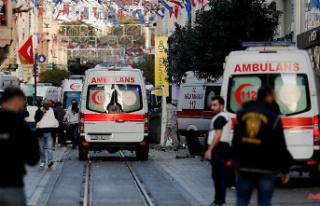In Weilheim, a man kills his wife, his sister-in-law and her husband. Why did this crime happen? The investigators are trying to answer this question. But they may keep the answer to themselves.
Three crime scenes, four dead people and one urgent question: What drives a man to kill his wife, her twin sister and her husband in the small town of Weilheim, southwest of Munich? Was it an outburst of violence in affect? Or a long-planned action? Is there a suicide note? Where did the suspect get his gun from? "The investigations are not complete just because the alleged perpetrator is dead," said police spokesman Alexander Huber. All of these questions will be investigated. "The backgrounds will be illuminated."
It remains to be seen how much the public will learn about the possible motive for the crime. "Ultimately, it is communicated that it is a relationship act," explains Huber. Since the 59-year-old is dead and there was no danger to the population, the question of the motive is also a question of privacy protection and will therefore probably not be disclosed in detail.
According to DPA information, the dead are twin sisters and their husbands. According to the police's previous findings, the 59-year-old first killed the 57-year-old woman and then the 60-year-old on Friday. The suspect then allegedly took his own life.
For reasons of privacy protection, the investigators do not want to reveal the exact relationship between the dead - except that they were related to each other. The police also did not say who lived where with whom and whether the dead had children.
In the small district town not far from the Alps, there was no sign of public sympathy on the days after the triple murder. Crime doesn't seem to be a big issue in Weilheim. "I haven't heard anything about it. That surprises me, because we have a lot of older customers, it's a very family environment, everything is usually discussed here," said a saleswoman in an organic grocery store in the city center on Saturday. City pastor Engelbert Birkle from the Catholic parish community Weilheim wants to commemorate the dead in the church. "We take up something like this in the services as part of an intercession," he says. The evangelical dean Jörg Hammerbacher also said that the crime would be discussed during church visits on Sundays.
Weilheim has about 23,000 inhabitants. The city is around 50 kilometers southwest of Munich in the Weilheim-Schongau district and is easy to reach by train from the state capital. On Sunday everything seems to be as usual. There are a few flowers at one of the crime scenes, and people have set out a handful of candles. Nothing is locked anymore. You can even sit down on the bench, which is still smeared with blood and on which the alleged perpetrator is said to have committed suicide.
According to investigators, the sisters died of "massive injuries" in the house of the alleged perpetrator. "The women had no gunshot wounds," emphasizes Huber. He also said nothing was known about possible stab wounds. The bodies will be autopsied on Monday. Huber expects the results of this investigation to be published on Tuesday at the earliest. After the attack on the twins, the suspect is said to have killed his brother-in-law - about a kilometer from where the women were found. A witness had discovered the 60-year-old lifeless in the garden of an apartment building in the center of town. Police say the body has a gunshot wound.
The 59-year-old is said to have committed suicide on a park bench near the Ammer River, less than three kilometers from where the 60-year-old was found. According to Huber, his body also had a gunshot wound.
A gun was lying next to the body. "Now it is being investigated whether it is the murder weapon," explains the police spokesman. "Of course that's close." He confirms information that the weapon is a handgun. He doesn't want to say whether it's a pistol or a revolver. In addition, it must still be determined whether the man was allowed to carry a weapon. Witness interviews continued, secured evidence would be examined.












